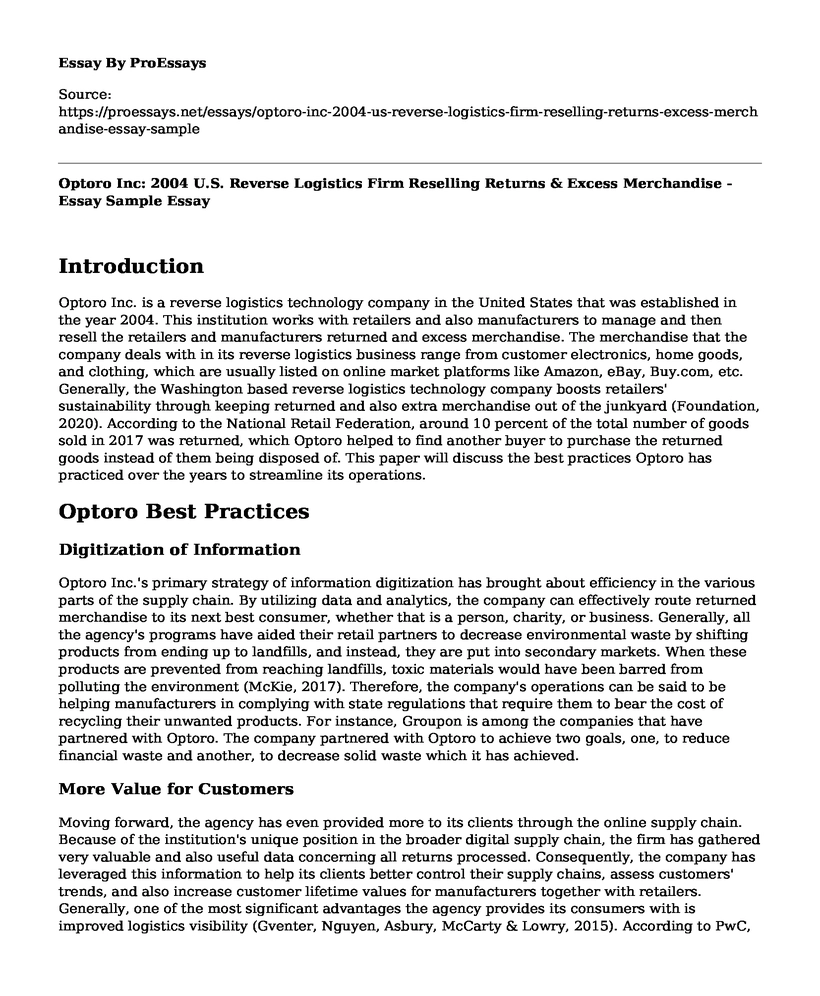Introduction
Optoro Inc. is a reverse logistics technology company in the United States that was established in the year 2004. This institution works with retailers and also manufacturers to manage and then resell the retailers and manufacturers returned and excess merchandise. The merchandise that the company deals with in its reverse logistics business range from customer electronics, home goods, and clothing, which are usually listed on online market platforms like Amazon, eBay, Buy.com, etc. Generally, the Washington based reverse logistics technology company boosts retailers' sustainability through keeping returned and also extra merchandise out of the junkyard (Foundation, 2020). According to the National Retail Federation, around 10 percent of the total number of goods sold in 2017 was returned, which Optoro helped to find another buyer to purchase the returned goods instead of them being disposed of. This paper will discuss the best practices Optoro has practiced over the years to streamline its operations.
Optoro Best Practices
Digitization of Information
Optoro Inc.'s primary strategy of information digitization has brought about efficiency in the various parts of the supply chain. By utilizing data and analytics, the company can effectively route returned merchandise to its next best consumer, whether that is a person, charity, or business. Generally, all the agency's programs have aided their retail partners to decrease environmental waste by shifting products from ending up to landfills, and instead, they are put into secondary markets. When these products are prevented from reaching landfills, toxic materials would have been barred from polluting the environment (McKie, 2017). Therefore, the company's operations can be said to be helping manufacturers in complying with state regulations that require them to bear the cost of recycling their unwanted products. For instance, Groupon is among the companies that have partnered with Optoro. The company partnered with Optoro to achieve two goals, one, to reduce financial waste and another, to decrease solid waste which it has achieved.
More Value for Customers
Moving forward, the agency has even provided more to its clients through the online supply chain. Because of the institution's unique position in the broader digital supply chain, the firm has gathered very valuable and also useful data concerning all returns processed. Consequently, the company has leveraged this information to help its clients better control their supply chains, assess customers' trends, and also increase customer lifetime values for manufacturers together with retailers. Generally, one of the most significant advantages the agency provides its consumers with is improved logistics visibility (Gventer, Nguyen, Asbury, McCarty & Lowry, 2015). According to PwC, advanced logistics visibility develops better communication and also coordination throughout the digital supply chain, from retailers or suppliers to consumers. This development allows for extra integrated programs and executions, hence enhancing efficiency and also decreasing costs. Therefore, a more effective digital supply chain, in turn, develops less waste and gives room for broader utilization of assets.
Conclusion
The story of Optoro Company is among the many other institutions that help other business organizations to thrive and grow. Apparently, this agency has come up with critical, innovative initiatives that not only help other companies to thrive but methods of reducing environmental pollution. Therefore, the company's operations have, to a greater extent, helped retailers and manufacturers in selling their extra inventory or returned goods instead of going to waste.
References
Foundation, H. (2020). How Startup Optoro Helps Groupon Keep Returns Out of the Trash. Retrieved 18 March 2020, from https://www.uschamberfoundation.org/blog/post/how-startup-optoro-helps-groupon-keep-returns-out-trash
Gventer, B., Nguyen, K., Asbury, K. M., McCarty, J., & Lowry, M. (2015). U.S. Patent No. 9,053,451. Washington, DC: U.S. Patent and Trademark Office. https://patents.google.com/patent/US9563870B1/en
McKie, E. C. (2017). Sustainable, Operations-enabled Solutions for Reducing Product Waste. scholarcommons.sc.edu/cgi/viewcontent.cgi?article=5242&context=etd
Cite this page
Optoro Inc: 2004 U.S. Reverse Logistics Firm Reselling Returns & Excess Merchandise - Essay Sample. (2023, Apr 19). Retrieved from https://proessays.net/essays/optoro-inc-2004-us-reverse-logistics-firm-reselling-returns-excess-merchandise-essay-sample
If you are the original author of this essay and no longer wish to have it published on the ProEssays website, please click below to request its removal:
- Essay Sample on Strategy and Business Innovation Model
- Merchandising Operations and Inventory in Walmart Inc Essay
- Apple Quality Management - Essay Sample
- Essay Sample on Internet Privacy: A Growing Global Concern?
- Essay Sample on AI and Its Impact on Commercial Recreation and Tourism
- Harnessing Energy From Fossil Fuels, Wind & Solar Power - Essay Sample
- AI in Military: Armored Vehicles Ready for Action - Essay Sample







